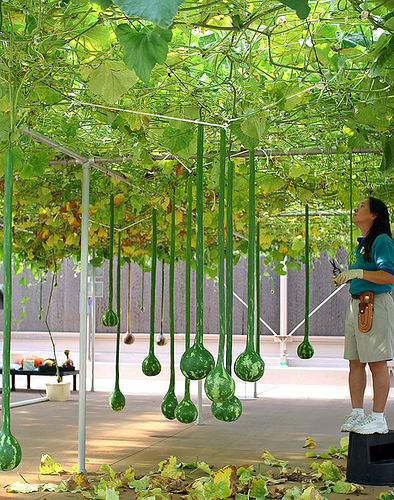Hydroponic Theory is a techniques for growing plants without soil. It
uses an inert medium (peat, sand, vermiculite, etc) and adding a
solution containing all the essential nutrients required for plant
normal growth. A purer form of hydroponics, water culture, involves
having plant roots water containing nutrients.
Hydroponic
Gardening Theory
By Alyssa
Bentley
Something that's been buzzing in the growing
community is the idea of growing your beautiful plants indoors using a
process called: Hydroponics. Now, Hydroponics is something that's no
good for those of you who garden specifically to get outside in the dirt
and dig around in the manure, but for those of us who do not have large
tracts of arable land, or any land at all, hydroponics starts to sound
like a much more attractive offer.
Photo: gardenvisit.com
Why
Hydroponics?
Hydroponic Gardens are compact and can be placed
anywhere.
They use and re-use water over and over and require
minimal additional water to function properly.
They eliminate the
need to watch for garden pests such as aphids, caterpillars, potato
beetles and fungus.
They are very efficient growers for plants -
plants grow very quickly in a hydroponic setup.
They are convenient,
and most systems are easy to automate so they require a minimum of
interference by you. Any plant can grow (or start to grow) in a
hydroponics system, regardless of the time of year, or how north or
south you are located.
There are other reasons why one would
choose hydroponics over a traditional garden, but there are also
detriments. For instance, many people associate hydroponic gardening
with the growing of certain illegal plants that are generally abused as
controlled substances. It seems like every week there's some large house
in a nice neighborhood that's being busted by the cops with hundreds of
compact fluorescent fixtures, water sprayers, containers, grow dirt,
nutrients and plants removed. However, just like anything, a small
percentage of people can ruin a good thing for everyone else.
In
reality, the main benefits to Hydroponic Gardening is to give people who
would otherwise be unable to grow plants the ability to grow plants.
It's very common for avid gardeners to start their tender young plants
out in a hydroponic setup, and then transfer those plants to their
gardens after the ground thaws.
Orchid growers, in particular,
seem to gravitate towards the hydroponic grow systems. The obsession
that many people have with Orchids is intense. This obsession, coupled
with the frustration of being unable to meet the exacting needs of the
orchid in a person's unaltered back yard, leads many to try growing in
greenhouses or in a hydroponic setup.
Additionally, the
technology for hydroponics is everywhere. Light timers are used in many
applications to conserve energy, just as they are used in hydroponics to
time the light cycle for plants. The compact fluorescent, metal halide,
T5 and other types of intense lighting used in Hydroponics are also
used on aquarium systems that strive to meet exacting needs for
freshwater plant life or delicate corals and anemones. Water drip
systems are used in greenhouses and in large scale agriculture, as well
as outdoor gardening and landscaping on a regular basis. Plant nutrients
have been in development for quite a long time - as long as there have
been people trying to grow non-native plants in partially depleted
soils. PH meters are used in scientific applications, and again in all
forms of gardening. We wouldn't know where the acidic soils to grow
grapes were located if we didn't use a PH tester, aside from costly
trial and error.
Hydroponics evolved out of a combination of need
and desire. We desire fresh tomatoes, we desire fresh basil, we need
somewhere to grow them because we don't all live on farms anymore. The
more we hear about plants being coated in wax and pesticides, the more
we worry about those substances getting into our children and ourselves,
and we want some way to be sure of our food sources. While it's
impractical to think that we could go from buying our food at the store
to growing it all in our apartments, it's nice to know that we can
supplement some of our produce in this way. Specialty sauces, for
instance, or your own personal herb garden for fresh cilantro, basil and
oregano are a tempting reason to go Hydroponic.
For die-hard,
natural gardens only people, hydroponics may not be your cup of tea. If
you're using plants that are native to your region, you simply sow your
seeds and let nature take its course. However, for many in northern
climates, the wait for spring is too far off. These people appreciate
the plant life that technology can bring to their homes.
Something
to keep in mind: Before this writer knew what hydroponics even was, she
was buying "Vine-ripened, hydroponically grown tomatoes" at the local
grocery store due to their superior color, texture and flavor. They were
consistently bright red, juicy, and devoid of spots. They were always
smaller than the so-called "stew tomatoes", but the bigger,
lighter-colored tomatoes had a less rich flavor. The balance of
nutrients, light and water combined with the plant's reduced need to
fight off infections, insects and fungus produces a much healthier plant
specimen than would otherwise be possible.
Alyssa is an Online
Marketing author who uses personal experience and research to write
informative articles for her clients. Hydroponic
Gardening is a fascinating subject, as it encompasses modern
technology and ancient agriculture together to produce better produce.
Alyssa writes this article for Grow Closet, one of the best,
economically sound resources for hydroponic supplies. They ship
discretely, too, for those concerned with that.